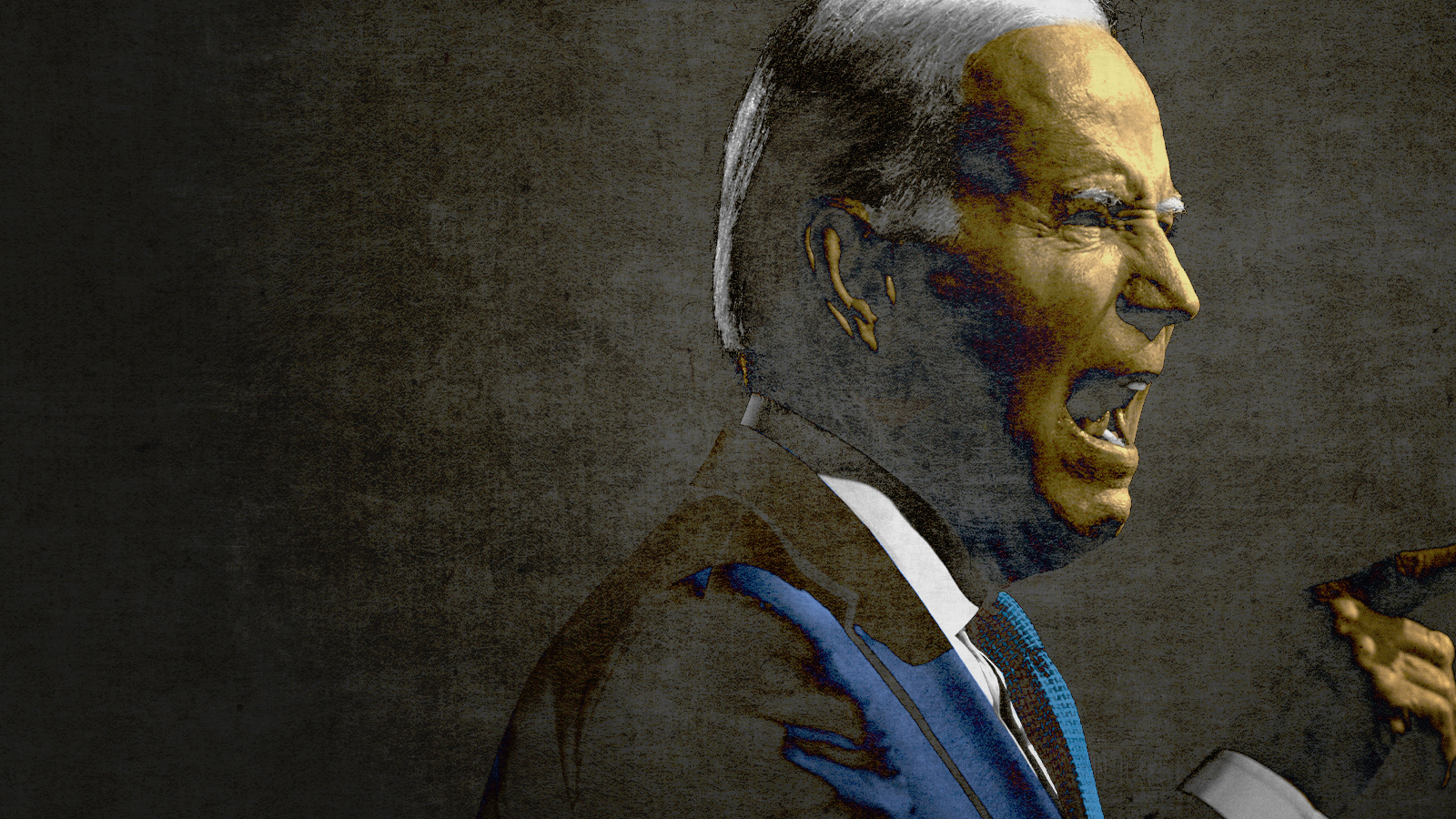Biden's call to defend democracy
Why Republicans are up in arms about the president's fiery Philadelphia speech


A free daily email with the biggest news stories of the day – and the best features from TheWeek.com
You are now subscribed
Your newsletter sign-up was successful
Last night, President Biden gave a fiery prime-time address on the subject of democracy, identifying former President Donald Trump and his Make America Great Again (MAGA) movement as the chief threat to the ongoing American democratic experiment. What did the president say, why did he say it, and what does it all mean? Here's all you need to know about Biden's speech:
Why did Biden make the speech?
Fresh off the best month of his presidency since the March 2021 COVID relief bill passed, President Biden delivered an address on the future of democracy last night in Philadelphia. It was a maneuver that would have seemed quixotic two months ago, when persistent inflation was the single biggest issue on the minds of voters, and activist Democrats were seething at the missed opportunities of the past two years and the party's fortunes in the midterm elections looked brutal. But the dramatic change in the national political environment spurred by the Supreme Court's decision to overturn Roe v. Wade, a string of Democratic legislative achievements, and the easing of inflation have created space for the president to return to democracy.
What did he say?
President Biden drew a direct line between Trumpism, the rollback of rights, and the rise of authoritarian tendencies in the GOP. "MAGA forces are determined to take this country backwards," he said. "Backwards to an America where there is no right to choose, no right to privacy. No right to contraception, no right to marry who you love." Biden claimed Republicans "promote authoritarian leaders," presumably referring to the public embrace of Russian strongman Vladimir Putin and Hungarian Prime Minister Victor Orbán by prominent MAGA supporters like Trump and Fox News prime-time host Tucker Carlson.
The Week
Escape your echo chamber. Get the facts behind the news, plus analysis from multiple perspectives.

Sign up for The Week's Free Newsletters
From our morning news briefing to a weekly Good News Newsletter, get the best of The Week delivered directly to your inbox.
From our morning news briefing to a weekly Good News Newsletter, get the best of The Week delivered directly to your inbox.
President Biden may also have been motivated by the success of election-deniers and conspiracy theorists in critical primary races across the country, fearing a rupture with the peaceful transfer of power after the next presidential election. A threat that had been abstract — the full takeover of the GOP by people invested in Trump's lurid conspiracy theories about the 2020 election — has become very real. From the governor's race in Arizona, where Republican Big Lie supporter Kari Lake is running even with her Democratic opponent, to secretary of state races across the country, MAGA supporters are all but promising to run a more successful version of Trump's 2020 playbook.
Biden and his party are the targets of this plot, and in Philadelphia, the president talked for the first time like he realizes the scale of the threat. It's not that the president has been silent about democracy throughout this term — after all, he made voting rights a centerpiece of his agenda. But throughout Biden's presidency, scholars of democracy have waited for the administration to respond with the appropriate level of panic to their sirens of alarm.
What caused the shift?
In November 2021, dozens of scholars and analysts of democracy signed a statement of concern warning that "defenders of democracy in America still have a slim window of opportunity to act. But time is ticking away, and midnight is approaching." Until now, most Democrats did not or could not speak to the public like this, especially the president.
Biden, and Democrats more largely, have generally approached threats to democratic rule as discrete problems: the need for more robust voting rights protections, the nefarious influence of dark money in politics, the problem of gerrymandering. Solutions to each were stuffed into the sprawling For the People Act that died in the Senate at the hands of Joe Manchin (D-W.V.) and Kyrsten Sinema (D-Ariz.). The president based his campaign on the idea that he could unify America by reaching across the aisle to sympathetic Republicans who were secretly disgusted by former President Trump's antics.
A free daily email with the biggest news stories of the day – and the best features from TheWeek.com
While he did not indict the entire Republican Party, Biden used his speech to single out the MAGA movement as the chief threat to the future of American democracy. "For a long time, we've reassured ourselves that American democracy is guaranteed," Biden said. "But it is not. We have to defend it. Protect it. Stand up for it. Each and every one of us."
And he was not shy about naming the culprit: "Donald Trump and the MAGA Republicans represent extremism that threatens the very foundations of our Republic," Biden said, calling for Americans to reject candidates aligned with former President Trump and his movement.
How has the GOP reacted?
Republicans were quick to attack the president's address. Republican National Committee spokeswoman Emma Vaughn offered perhaps the sharpest rebuke: "Biden has pitted neighbors against each other, labeled half of Americans as fascist, and tarnished any idea of his promise of 'unity,'" she said.
Earlier in the week, in response to Biden's preceding remarks about MAGA "semi-fascism," House Minority Leader Kevin McCarthy (R-Calif.) said that the president "has chosen to divide, demean, and disparage his fellow Americans — simply because they disagree with his policies." Prior to the Philadelphia speech, McCarthy called on Biden to "apologize for slandering tens of millions of Americans as fascists."
Similar denunciations were issued by leading Republicans like controversial Rep. Lauren Boebert of Colorado. Republicans are likely to push the critique that the president and his allies are speaking and acting in ways that are worsening America's political divides.
What else are people saying?
Some journalists also attacked Biden for the optics. CNN's Jeff Zeleny didn't object to the substance of the address but complained that "doing it against a backdrop of two Marines standing at attention and the Marine Band is a break with White House traditions."
The speech was noticeably the culmination of a major shift in tone and strategy from the White House, from a largely conciliatory stance toward Republicans to a much more combative one. Indeed, whether Biden's change of course — not only in his new rhetoric about MAGA but also in the abrupt shift in the tone of the White House Twitter account — will pay dividends in November is an open question.
To be sure, it will, if nothing else, set the stage for the next several months of political combat between Democrats and Republicans hoping to increase their power at the federal and state levels.
David Faris is a professor of political science at Roosevelt University and the author of "It's Time to Fight Dirty: How Democrats Can Build a Lasting Majority in American Politics." He's a frequent contributor to Newsweek and Slate, and his work has appeared in The Washington Post, The New Republic and The Nation, among others.
-
 What to know before filing your own taxes for the first time
What to know before filing your own taxes for the first timethe explainer Tackle this financial milestone with confidence
-
 The biggest box office flops of the 21st century
The biggest box office flops of the 21st centuryin depth Unnecessary remakes and turgid, expensive CGI-fests highlight this list of these most notorious box-office losers
-
 What are the best investments for beginners?
What are the best investments for beginners?The Explainer Stocks and ETFs and bonds, oh my
-
 The ‘mad king’: has Trump finally lost it?
The ‘mad king’: has Trump finally lost it?Talking Point Rambling speeches, wind turbine obsession, and an ‘unhinged’ letter to Norway’s prime minister have caused concern whether the rest of his term is ‘sustainable’
-
 The billionaires’ wealth tax: a catastrophe for California?
The billionaires’ wealth tax: a catastrophe for California?Talking Point Peter Thiel and Larry Page preparing to change state residency
-
 Bari Weiss’ ‘60 Minutes’ scandal is about more than one report
Bari Weiss’ ‘60 Minutes’ scandal is about more than one reportIN THE SPOTLIGHT By blocking an approved segment on a controversial prison holding US deportees in El Salvador, the editor-in-chief of CBS News has become the main story
-
 Memo signals Trump review of 233k refugees
Memo signals Trump review of 233k refugeesSpeed Read The memo also ordered all green card applications for the refugees to be halted
-
 Has Zohran Mamdani shown the Democrats how to win again?
Has Zohran Mamdani shown the Democrats how to win again?Today’s Big Question New York City mayoral election touted as victory for left-wing populists but moderate centrist wins elsewhere present more complex path for Democratic Party
-
 Millions turn out for anti-Trump ‘No Kings’ rallies
Millions turn out for anti-Trump ‘No Kings’ ralliesSpeed Read An estimated 7 million people participated, 2 million more than at the first ‘No Kings’ protest in June
-
 Democrats: Harris and Biden’s blame game
Democrats: Harris and Biden’s blame gameFeature Kamala Harris’ new memoir reveals frustrations over Biden’s reelection bid and her time as vice president
-
 ‘We must empower young athletes with the knowledge to stay safe’
‘We must empower young athletes with the knowledge to stay safe’Instant Opinion Opinion, comment and editorials of the day
